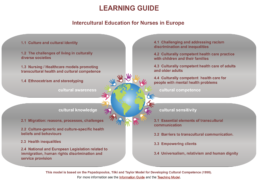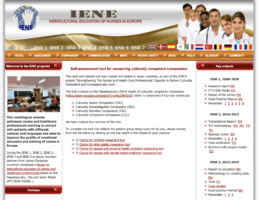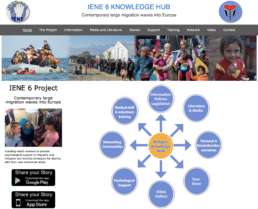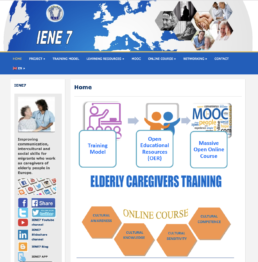The IENE Programme
The IENE programme was established in 2008. Since then, eight projects have been funded by the European Union the intellectual outputs of which can be accessed freely at www.ieneproject.eu .
The first six project were co-ordinated by the Research Centre for Transcultural Studies in Health. The materials/resources are suitable for student and qualified nurses and other healthcare workers and leaders, aimed at improving their cultural competence and compassion in practice.
The IENE1 project (2008-2010) was funded by the EU Leonardo Da Vinci Lifelong Learning Programme. It addressed cultural competence in pre-qualifying nursing and AHPs (Allied Health Professionals) as well as for qualified healthcare professionals who wished to move within the European Union. In addition to the multilingual internet platform, The PTT/ IENE European model for cultural competence was developed along with a number of module outlines based on a needs assessment of nurses and AHPs working in the partner countries which were: UK (co-ordinator), Romania, Germany, Bulgaria and Belgium.
OUTPUT FROM IENE 1
The Learning Guide can be found on the IENE website (http://ieneproject.eu/learning.php) and all statements in the image are live links to detailed resources.
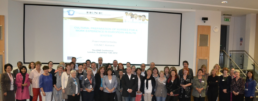
In 2010, the EU funded the IENE2 Transfer of Innovation project which built on the IENE1 project but also included a short ‘Train the Trainer’ course for healthcare educators and trainers which was delivered in the partner institutions: UK (co-ordinator), France, Belgium, Romania and Germany. The PTT/IENE model is was embedded in the education for nurses and other healthcare workers in the aforementioned countries. If you wish to find out about the outputs of this project please go to http://ieneproject.eu/IENE2/about-objectives.php
OUTPUT FROM IENE2 PROJECT
Report on the MODEL FOR THE IENE2 ‘TRAIN THE TRAINER’ COURSE
You can read the report here:
http://ieneproject.eu/download/Outputs/Training%20methodology_EN.pdf
If you wish to read the Summary of the external evaluation of the IENE2 project conducted by Dr Elitsa Uzunova, Method Lab EOOD, please click on this link the link and go to page 10 http://ieneproject.eu/download/Conference/Conference%20Brochure.pdf
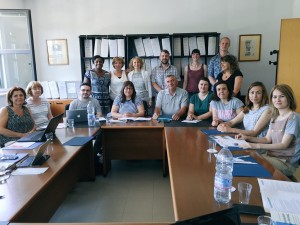 In 2013, the EU funded the IENE3 project in collaboration with partners from UK (co-ordinator), Romania, Netherlands, Germany, Italy and Turkey. The project developed innovative tools for the teaching and learning of culturally competent compassion, intercultural communication, and courage in healthcare practice.
In 2013, the EU funded the IENE3 project in collaboration with partners from UK (co-ordinator), Romania, Netherlands, Germany, Italy and Turkey. The project developed innovative tools for the teaching and learning of culturally competent compassion, intercultural communication, and courage in healthcare practice.
Go to http://ieneproject.eu/IENE3/about-objectives.php to find more about the project.
EXAMPLE OF OUTPUT FROM IENE3 PROJECT
Read our comprehensive Good Practice Manual.
Strengthening the nurses’ and health professionals’ capacity to deliver culturally competent and compassionate care
In 2014, the EU ERASMUS+ funded project IENE4 titled ‘Strengthening The Nurses’ And Health Care Professionals’ Capacity To Deliver Culturally Competent And Compassionate Care’. Its main aims were to develop a self-administered tool to measure culturally competent compassion, and to develop and deliver training to promote culturally competent and compassionate leadership. This was a partnership between UK (co-ordinator), Romania, Denmark, Cyprus, Italy, Spain and Turkey.
To learn more about the significant out puts from this study go to http://ieneproject.eu/IENE4/about-objectives.php.
EXAMPLES OF OUTPUT FROM IENE4 PROJECT
To read our report on the IENE4 “European Model For Developing Culturally Competent And Compassionate Healthcare Leadership” click on this link:
http://ieneproject.eu/download/Outputs/IENE4%20%20European%20Model.pdf
Why not use one of our self-assessment tools to find out how compassionate you are. The tool and all the instructions can be found here: http://ieneproject.eu/assessment.php
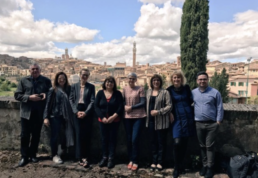
Multicultural Healthcare Teams, Patient Safety and Intercultural Communication
In 2015 the EU ERASMUS+ funded the IENE5 project ‘Multicultural Healthcare Teams, Patient Safety and Intercultural Communication’. The aim of the IENE5 was to develop an Massive Online Open access Course (MOOC) for teaching / learning patient safety and intercultural communication, within multicultural multidisciplinary teams. The partners were, UK (co-ordinator), Romania, Italy, Cyprus and Denmark.
To find out more about this exiting project please click this link:
http://ieneproject.eu/IENE5/about-objectives.php
EXAMPLE OF OUTPUT FROM IENE5 PROJECT
Contemporary large migration waves into Europe: Enabling health workers to provide psychological support to migrants and refugees and develop strategies for dealing with their own emotional needs
In 2016 the EU ERASMUS+ funded IENE6 project ‘Contemporary large migration waves into Europe: Enabling health workers to provide psychological support to migrants and refugees and develop strategies for dealing with their own emotional needs’. The aim of this project was to develop a knowledge hub (KHub) which contains tools and information designed to provide psychological support and training to refugees, healthcare workers and volunteers. During this project we developed an app which enables refugees, volunteers and healthcare workers to compose and submit their stories on the KHub. The partners in this project: UK (co-ordinator), Romania, Spain, Cyprus and Greece and Turkey.
To learn more about this unique project please visit the knowledge hub at http://ienerefugeehub.eu/.
OUTPUT FROM IENE6 PROJECT
The project’s outputs are shown on the wheel image above. You can click each activity as shown in the diagram and it will take you to the relevant content. On the left-hand margin, you will find the ‘story app icon’ and you can download this on your phone if you wish to contribute a story to our hub. Below the app icon, you will see the ‘Blog icon’. Please visit the blog and read interesting and thought-provoking blogs. You can also reach the IENE6 blog by click on this link:
Improving communication and social skills of foreign and migrant caregivers who work with older people
In 2017, the EU ERASMUS+ IENE7 project ‘Improving communication and social skills of foreign and migrant caregivers who work with older people’. This project compares the training, role descriptions and regulation of care workers in the partner countries and based on that information a European model for their training has been developed. Currently, the project is preparing the relevant units of learning which will be delivered as a MOOC in 2019. The partners in this project: Romania, (co-ordinator), UK, Spain, Italy.
You can find out more about this project and its forthcoming MOOC by going to: https://iene7.eu/
Refugees- Parenting in transit
In 2018 we gained funding for the EU ERASMUS+ for the IENE8 project ‘Refugees- Parenting in transit’. The project aims to examine the challenges faced by refugees who have children, during their flight from their homeland. We aim to create resources which will help the refugee parents remain compassionate parents despite the challenges and terrible conditions they encounter during their journey to safety. The partners in this project: Cyprus (co-ordinator), UK, Greece, Italy, Germany.
Developing a culturally competent and compassionate LGBT+ curriculum in health and social care education
Evidence shows there is a need to ensure that health and social care professionals are capable to deliver care and support to a diverse population (EHRC, 2010). However, issues with professional conduct and discrimination against Lesbian, Gay, Bisexual, Transgender (LGBT+) people in health and social care, continue to exist in the UK (Stonewall, 2015) and most probably in most EU countries.
This unsatisfactory position indicates the need to ensure that health and social care professional education includes exploration of LGBT+ issues, in order to enable health professionals to provide quality services which are free from prejudice to this population. However, there are numerous challenges which the educators must address and overcome in order to achieve this aim, including ignorance and fear, lack of confidence; negative religious, cultural and personal views; the lack of a learning culture that values diversity, and so on (Davy et al, 2015; Pezzella & Carr, 2016).
Research suggests that specific training on LGBT+ issues may result in better knowledge and skills of the health and social care workforce, which reduces the heteronormative and cisgendered (when a person’s sense of personal identity and gender corresponds with their birth sex) communication between providers and LGBT+ people, as well as diminishing the feelings of stigma and discrimination experienced by LGBTQ+ people (Sekoni, Gale, Manga‐Atangana, Bhadhuri, & Jolly, 2017). Despite this, there seems to be a lack of covering in LGBT+ health needs in the health and social care curriculum. Hence, there are limited resources and teaching material on the LGBT+ issues.
Project aims
The project “Developing a culturally competent and compassionate LGBT+ curriculum in health and social care education“ aims to enable teacher/trainers of theory and practice to enhance their skills regarding LGBT+ issues and develop teaching tools to support the inclusion of LGBT+ issues within health and social care curricula. The newly culturally competent and compassionate LGBT+ curriculum will be delivered though a MOOC which is aimed at health and social care teachers/trainers, workers, professionals and and learners across Europe and worldwide.
Project objectives
The main achievements of the project will be:
- To develop teaching and learning tools to be used by health and social care educators/trainers in order to improve their own knowledge and confidence in teaching LGBT+ issues;
- To develop the knowledge of health and social care professionals on how to support LGBT+ patients and meet their health care needs;
- To produce a best practice guides on how to develop an LGBT+ inclusive curriculum;
- To prepare and pilot a Massive Open Online Course (MOOC) to support the participants in developing an awareness of LGBT+ needs in health and social care across Europe and the world.
- The MOOC will help participants to acquire relevant knowledge, professional skills and key competences, including intercultural and social skills, as well as digital skills and become empowered with the capacity to establish positive communication, friendly environment and positive interaction and relationships with LGBT+ individuals.
Find out more
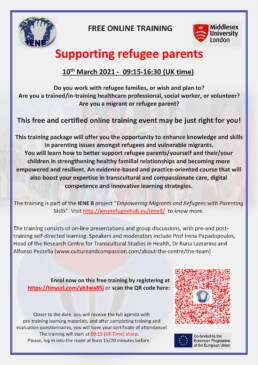
ALL THE IENE INTELLECTUAL OUTPUTS ARE DEVELOPED USING RIGOROUS AND APPROPRIATE RESEARCH METHODS, THEY ARE PILOTED AND EVALUATED BY USERS.

